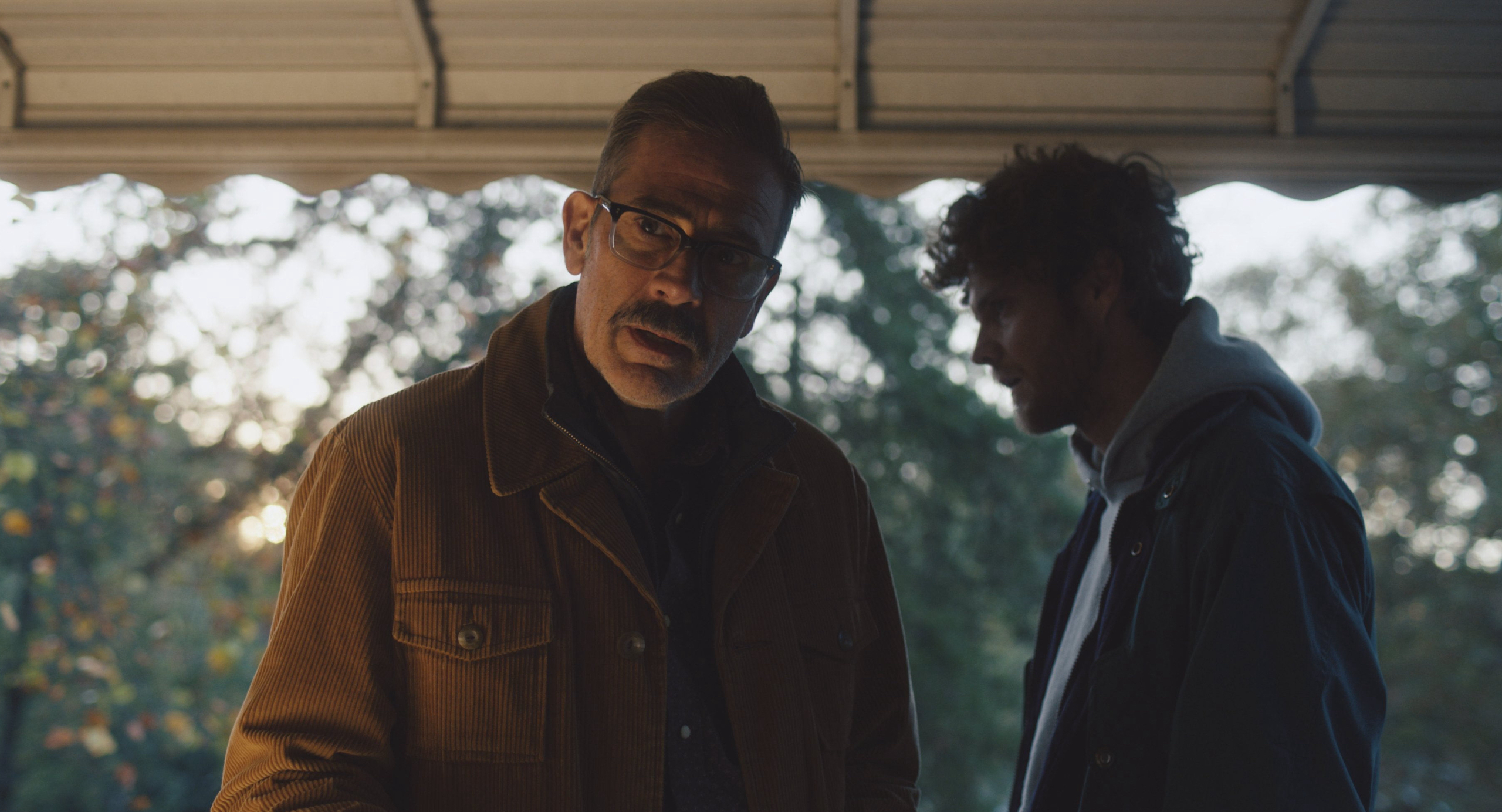Neighborhood Watch – Film Review
Published April 26, 2025

Duncan Skiles’ Neighborhood Watch, written by Sean Farley, brings an emotional and suspenseful edge to the crime thriller genre by focusing less on explosive action and more on damaged people striving to do the right thing against overwhelming odds. Bolstered by strong performances from Jack Quaid and Jeffrey Dean Morgan, the film carefully balances psychological tension with a gritty, slow-burn mystery. While not without some unevenness in pacing and emotional beats, Neighborhood Watch is worth your time for its heartfelt approach and unnerving atmosphere.
Set in Homewood, Alabama, Neighborhood Watch introduces Simon McNally (Jack Quaid), a young man struggling with paranoid schizophrenia after spending nearly a decade institutionalized. His fragile existence, overseen by his beleaguered sister DeeDee (Malin Akerman), is thrown into chaos when he believes he witnesses a woman’s abduction. The authorities, particularly Detective Glover (Cecile Cubiló), dismiss his report as another episode stemming from his illness. Desperate, Simon enlists Ed Deerman (Jeffrey Dean Morgan), a grizzled and reluctant former security guard, to help him uncover the truth.
What immediately sets Neighborhood Watch apart is its refusal to sensationalize Simon’s mental illness. The script treats Simon with empathy and realism, portraying his hallucinations, especially those involving the abusive specter of his dead father, as terrifying intrusions rather than dramatic spectacle. Jack Quaid delivers arguably one of his best performances to date, making Simon simultaneously sympathetic, frustrating, and courageous. Quaid’s portrayal gives a lived-in authenticity to Simon’s internal struggle, particularly when he doubts his own senses yet feels morally compelled to act.
Jeffrey Dean Morgan is a perfect foil as Ed. His portrayal of a tired, wary man whose skepticism gradually gives way to real concern is subtle and convincing. Morgan avoids caricature, lending Ed enough roughness to feel authentic, while letting a deeply buried compassion emerge as the story progresses. The chemistry between Quaid and Morgan drives the film’s emotional core, creating a mentor-mentee relationship that feels natural rather than forced.
Director Duncan Skiles, who previously helmed The Clovehitch Killer, once again shows a knack for creeping tension and ordinary horror. His direction is understated but effective, allowing suspense to build through small, unsettling moments rather than flashy action. Scenes often stretch out with unbearable quiet, the camera lingering on Simon’s increasingly anxious expressions or Ed’s worried glances. Skiles excels at making the familiar feel claustrophobic: diners, DMV offices, suburban homes — all become ominous landscapes of dread and uncertainty under his watchful eye.
Sean Farley’s screenplay is smart in its construction, though it occasionally stumbles under the weight of its own ambition. The investigation, driven by intuition and piecemeal evidence, feels appropriately messy and frustrating, but there are moments where the momentum flags. Some viewers might find the middle portion sagging slightly as Simon and Ed chase down leads that don’t immediately seem to pay off. However, this slow pace mirrors the real-world difficulty of amateur investigations and maintains a grounded sense of stakes — there’s no magic clue that neatly unravels the mystery here.
A notable strength of the script is how it plays with perception and reality. Simon’s perspective is frequently unreliable, forcing the audience to question what’s real alongside him. Skiles and cinematographer Luke McCoubrey visually reinforce this uncertainty with clever use of focus and framing: backgrounds blur unexpectedly, figures loom in the corner of the frame, and the lighting subtly shifts to reflect Simon’s deteriorating grip on reality. It’s an elegant approach that underscores the film’s central question — is Simon’s belief justified, or is he spiraling into another delusion?
Cecile Cubiló’s Detective Glover could have easily fallen into a lazy archetype of the dismissive cop, but Cubiló plays her with enough nuance to suggest a mixture of genuine concern and institutional fatigue. Glover’s skepticism, while frustrating, is rooted in painful experience rather than outright malice, adding a layer of tragic realism to Simon’s uphill battle for credibility.
Malin Akerman also deserves praise for her portrayal of DeeDee. While the film doesn’t spend as much time on her character as it could have, Akerman makes the most of her scenes, conveying DeeDee’s exhaustion, love, and guilt with subtlety. Her presence reminds viewers that Simon’s struggles extend beyond his own pain, affecting those who love him as well.
When Neighborhood Watch builds toward its climax, Skiles expertly ratchets up the tension without betraying the film’s grounded tone. The finale is satisfyingly taut without resorting to melodrama, and crucially, it maintains its emotional focus on Simon’s journey rather than simply wrapping up the plot. By the end, Neighborhood Watch achieves something quietly powerful: it shows that courage doesn’t always look heroic and that victories can be bittersweet and imperfect.
The film’s greatest achievement is how it frames acts of heroism through the lens of personal struggle rather than physical prowess. Simon’s battle isn’t just against an external threat, but against the internal demons that constantly tell him he’s incapable or worthless. In this respect, Neighborhood Watch feels as much like a psychological drama as it does a crime thriller, and that duality gives it unexpected emotional resonance.
Still, the film isn’t without flaws. Some supporting characters are thinly drawn, and a few key plot points rely on a degree of coincidence that strains believability. While the slow burn approach is mostly effective, trimming ten minutes from the second act could have sharpened the tension even more. There’s also a sense that the film’s resolution, while moving, skirts around some of the darker implications of Simon’s actions and trauma, choosing instead a note of cautious optimism.
Overall, Neighborhood Watch succeeds because it understands that suspense isn’t just about danger — it’s about vulnerability, fear, and the courage to act even when you’re unsure of yourself. Anchored by standout performances and patient, empathetic storytelling, it offers a compelling, if imperfect, experience that lingers long after the credits roll.
